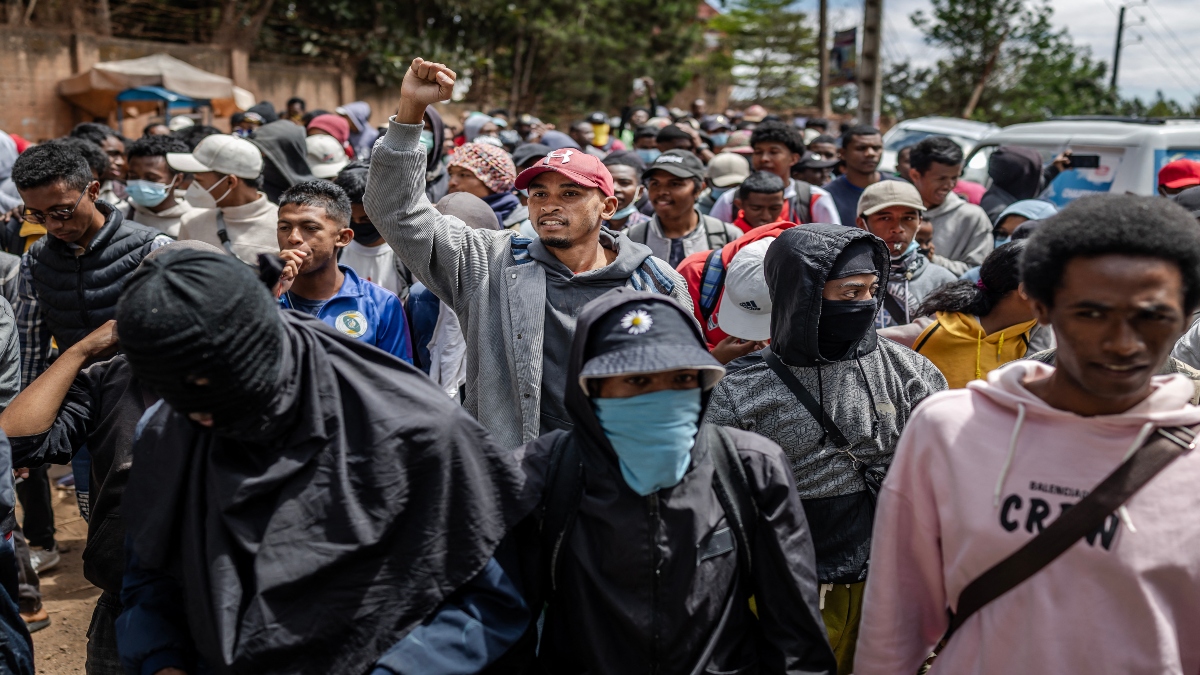Madagascar’s President Andry Rajoelina on Monday appointed General Ruphin Fortunat Dimbisoa Zafisambo as the country’s new prime minister, in a bid to ease mounting anti-government protests that have pushed the nation into political crisis.
The appointment came as security forces used tear gas to disperse hundreds of demonstrators in the capital, Antananarivo — part of near-daily, youth-led protests that have continued since September 25. At least one person was injured, according to AFP.
Initially triggered by widespread frustration over ongoing power and water outages, the protests have since evolved into a broader movement demanding President Rajoelina’s resignation.
“With wisdom, I have decided to appoint Ruphin Fortunat Dimbisoa Zafisambo, Divisional General, as Prime Minister of the government,” AFP quoted Rajoelina as saying late Monday.
The new premier should “serve the people” and be “someone clean, with integrity, and who works quickly”, Rajoelina said, speaking from the presidential palace.
Despite President Rajoelina’s declaration that he was “ready to save Madagascar”, his decision to dismiss the entire government last week has done little to calm the unrest.
On the 12th consecutive day of demonstrations, security forces used stun grenades and tear gas to break up two protest marches in Antananarivo. The movement, largely organised on social media by a youth-led group called Gen Z Mada, drew a heavy security response.
University students and local residents began marching from the University of Ankatso on the capital’s outskirts toward the city centre but were blocked by a police barricade.
Clashes broke out during the afternoon, with at least one young man injured and taken to the main hospital, according to AFP.
“There are about 120 hours of power cuts per week where I live,” AFP quoted 21-year-old protester Tommy Fanomezantsoa as saying.
“We are protesting for everyone’s sake,” he said. “The president is not listening to the anger of the people at the bottom. He always does what he wants.”
Deadly clashes
The Ankatso district was the birthplace of a 1972 revolt that led to the ousting of the first president of the poverty-stricken island, Philibert Tsiranana.
“The future of this country depends on me, on you, on all of us,” one of the protest leaders told the crowd of several hundred people, urging them not to allow the movement to lose momentum.
“We can clearly see that democracy in Madagascar is not respected at all,” said another protest leader.
“They are even destroying it with brutality,” he said.
He was referring to a United Nations statement last week that at least 22 people had been killed in the protests and more than 100 wounded, a figure rejected by the authorities.
The UN also condemned what it called a heavy-handed response by security forces, including the use of live ammunition.
AFP journalists witnessed a pregnant woman going into convulsions as crowds of people, including many children, fled from police in the hilly cobbled streets of Amparibe neighbourhood.
Local media also reported a protest in the southern city of Toliara, where demonstrators burned tyres.
‘Continue until results’
Ahead of General Zafisambo’s appointment, some were unimpressed by Rajoelina’s promise of a change of prime minister.
“We don’t want him to listen to people in his office, we want him to get out on the ground,” said Fanomezantsoa, a demonstrator who has been unemployed since the supermarket where he worked was looted on the first night of the protests.
“We will continue until we get results,” he said.
The Christian Council of Churches of Madagascar (FFKM) has said it is prepared to mediate between the government and protesters.
The Gen Z movement has taken inspiration from similar youth-led movements in Bangladesh, Nepal and Indonesia, waving a pirate flag from the Japanese manga comic One Piece.
Despite its natural resources, Madagascar remains among the world’s poorest countries.
Nearly three-quarters of its population of 32 million were living below the poverty line in 2022, according to the World Bank.
Corruption is widespread and the country ranks 140th out of 180 in Transparency International’s index, which ranks countries by their perceived level of public sector corruption.
With inputs from agencies
End of Article

)

